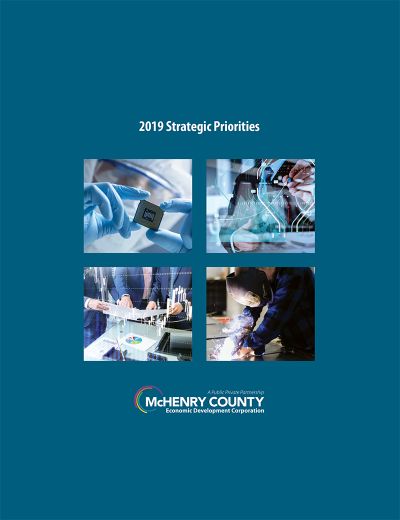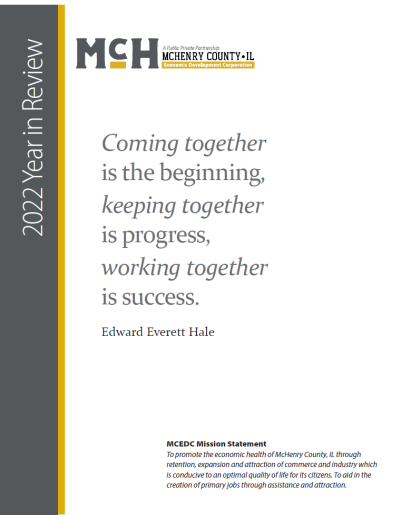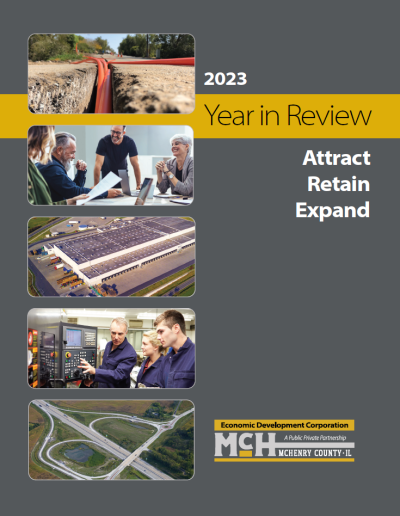About McHenry County EDC
What We Do
The McHenry County Economic Development Corporation (MCEDC) is a non-profit Public/Private business advocacy group comprised of business and industry investors from throughout the county.
The effectiveness of the MCEDC lies in our ability to collaborate with industry, government and community stakeholders. Often thought of as a conduit, MCEDC plays a central role in leveraging the resources of McHenry County – such as businesses, utilities, educational institutions, chambers of commerce, banks, real estate developers, neighborhood groups, foundations, NGO’s, and more – to support economic development.
We establish relationships, build networks, and design and implement long-term economic development strategies. The MCEDC acts as a liaison between the Public and Private sectors and connects businesses with the resources they need to expand and succeed. Our goal is to help businesses and municipalities thrive.
A non-governmental organization, the McHenry County EDC seeks to work with local, county, state and federal legislators to foster, enhance and improve the economic vitality of McHenry County.
Our Mission
- To promote the economic health of McHenry County, IL through attraction, retention, and expansion of commerce and industry which is conducive to an optimal quality of life for its citizens.
- To aid in the creation of primary jobs through assistance and attraction.
- To facilitate an economic development structure which enables individual communities within this county to realize opportunities to promote the same common good for their residents.
What Is Economic Development?
Professional Economic Developers engage in numerous tasks that support the community’s economic well-being. While many may specialize in different areas, understanding how they intersect is essential to success. Economic developers regularly engage in:
Marketing & Attraction: Economic developers develop and execute marketing & attraction strategies and campaigns to market their community to existing and potential businesses. The right marketing strategy can promote a community’s unique qualities, programs, and resources, while targeting a particular industry sector or audience, strengthening a community’s economic well-being.
Real Estate Development: Economic developers are frequently engaged in major real estate development projects, particularly industrial parks, incubators, brownfields redevelopment, and sometimes housing. Although the vast majority of real estate development projects are a response to market forces, economic developers’ engagement is crucial where public sector support is the only way to ensure equitable development projects in a community. Development projects are integrated with the economic development plan for the community.
Workforce Development: Economic developers work in concert with workforce development agencies to support a robust, resilient talent pool for existing and future businesses in their community. This includes engaging with businesses to know their current and future talent demands, working with educational institutions to translate that into training programs, and partnering with workforce development agencies to develop policies that support businesses and workers alike.
Disaster Recovery & Resiliency: Natural and economic disruptions require extensive planning to build resiliency and execute recovery. Economic developers play a vital role in helping their communities prepare for and recover from economic disruption. This work involves analysis of existing vulnerabilities, technical assistance for businesses, and community planning involving many community stakeholders, among other activities.
Business Retention & Expansion: Business retention and expansion (BRE) is an essential component of economic development. BRE programs help existing businesses survive economic difficulties and assist with expansions that create new jobs. This area consists of assessing the physical, geographical, financial, technological, and human resource needs of companies within the community.
Entrepreneur and Small Business Development: Supporting small businesses and entrepreneurs is one of the core functions of economic development. Whether it provides access to capital, incubator space to develop the next big thing, technical assistance to navigate regulatory processes, or support for entering a new market overseas, economic developers are ‘all in’ when it comes to entrepreneurs and small businesses.
Finance: When it comes to finance, economic developers primarily help businesses access public and private financial services available in the community. Economic developers play various roles in the space, from convening capital resources to hosting revolving loan funds to incorporating a Community Development Financial Institution (CDFI) within the EDO.
Strategic Planning: Economic developers are involved in the development and execution of a community or region’s strategic plan. The strategic plan provides a path toward economic success and well-being and incorporates several key stakeholders. The role of an economic developer as a convener is perhaps no more critical than in the context of a community’s strategic plan
International Opportunities: Economic developers are increasingly engaged in international opportunities to support their local and regional economy.
These activities include attracting Foreign Direct Investment (FDI) into their community, working with their businesses in exporting to overseas markets, and remaining knowledgeable about current trade issues and how they may impact their economy.


